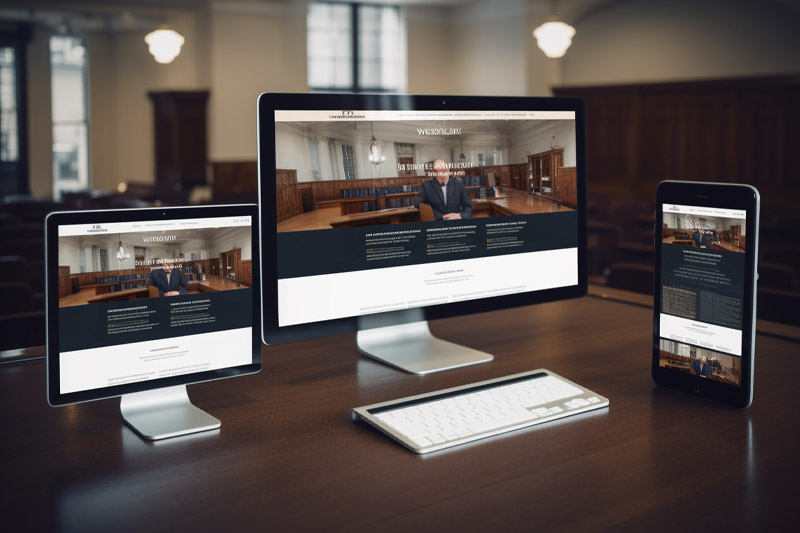Attorney website designers are pivotal in establishing a strong online presence for law firms in an increasingly digital world. Improve the web visibility of your law practice by working with these talented designers who are aware of the particular requirements of the legal sector.
Moreover, as specialized professionals, they possess the unique skill set needed to create visually appealing, user-friendly. And informative websites that effectively convey a firm’s values, expertise, and commitment to serving its clients.
However, this article will delve into the various aspects of their work and the importance of their contributions to a law firm’s success in the digital age.
The Role of attorney website designers
The Role of attorney website designers is essential for the success of a law firm’s online presence. The following are some salient features of their work in bullet form:
- Understand client’s needs and target audience: Firstly, design a website that caters to the specific requirements of the law firm and its potential clients.
- Create an easy-to-navigate website: Secondly, ensure clear headings and well-organized content, allowing users to find the necessary information quickly.
- Apply search engine optimization (SEO) techniques: Thirdly, achieve a high-ranking website on search engines like Google, attracting more potential clients.
- Proficiency in web development technologies: After that, Utilise HTML, CSS, JavaScript, and content management systems to build responsive and user-friendly websites.
- Prioritize website security and compliance: Then, adhere to legal regulations and ethical guidelines, protecting the law firm and its clients from potential online threats.
- Produce engaging content: Furthermore, develop informative articles, case studies, and testimonials to showcase the law firm’s expertise and credibility.
- Monitor website performance: Additionally, continually evaluate the website’s performance and make the required modifications to guarantee the best possible customer experience.
- Stay up-to-date with the latest trends: Finally, keep current with web design and technology developments to create cutting-edge websites. Also, that stand out from the competition and effectively communicate the law firm’s brand identity.
Overall, attorney website designers are instrumental in shaping a law firm’s online presence and attracting potential clients. Utilizing their design, technology, and content creation expertise, they craft user-friendly and engaging websites. Surely, that effectively showcase a firm’s credibility and professionalism.
Key elements of a successful attorney website design
A successful attorney website design is essential for creating a strong online presence, attracting potential clients, and establishing credibility and trust with visitors. An effective lawyer website design should have the following elements:
- Clear and concise messaging: Visitors to an attorney’s website should be able to quickly and easily understand what services are offered and how they can benefit from them.
- Easy navigation and user experience: To make it simple for visitors to find what they’re searching for and take action, the website should be created with intuitive navigation and user experience.
- Mobile responsiveness and compatibility: The website needs to be mobile-friendly so that smartphones and tablets can easily access and navigate it.
- High-quality images and multimedia content: Using high-quality images and multimedia content can help engage visitors and make the website more visually appealing.
- Call-to-action buttons and forms: The website should include clear and prominent ones encouraging visitors to take action, such as scheduling a consultation or contacting the attorney.
- Professional design: The website should have a polished appearance representing the lawyer’s brand and exuding credibility and dependability.
- Search engine optimization (SEO): To increase its exposure and position on search engine results pages, the website should be optimized for search engines, including by employing pertinent keywords and meta tags.
Overall, a successful attorney website design should focus on delivering a positive user experience and encouraging visitors to take action, reflecting the attorney’s brand and conveying professionalism and credibility.
How to Find the Right Attorney Websites Designer for Your Needs
Finding the right attorney website designer for your needs is crucial to ensure your law firm’s online presence effectively communicates your services and expertise to potential clients. Take the following actions to choose the ideal web developer for your legal firm:
Determine your goals and requirements:
Before beginning your search, outline your law firm’s specific needs, objectives, and budget. Consider website functionality, design preferences, and content management system (CMS) requirements.
Conduct research:
Start by researching reputable attorney website designers, exploring their portfolios, and reading reviews from other law firms. You may assess their level of experience and the caliber of their work using this.
Check their portfolio:
A designer’s portfolio is an excellent way to gauge their design style, creativity, and experience. Look for designers with a strong portfolio showcasing a variety of websites for law firms and attorneys. Ensure their designs are user-friendly, visually appealing, and professional.
Evaluate their expertise and services:
Choose a designer specializing in attorney websites who deeply understands the legal industry’s unique needs. Assess their services, such as SEO, content writing, and ongoing website maintenance.
Compare pricing and packages:
Contact several website designers to request quotes and compare their pricing and packages. Consider their value and weigh the cost against the quality of their work and the range of services provided.
Communication and responsiveness:
The designer’s ability to communicate effectively and respond promptly to your questions is crucial for a smooth working relationship. Consider their communication style, availability, and how well they understand your law firm’s needs.
Read client testimonials and reviews:
Look for client testimonials and reviews to understand better the designer’s work quality, customer service, and reliability. Also, look for reviews from other law firms or attorneys to ensure the designer has experience in the legal industry.
Assess their technical skills and knowledge:
Ensure the designer is proficient in the latest web technologies and design practices, such as responsive design, mobile optimization, and ADA compliance.
Inquire about ongoing support and maintenance:
Basically, a smart website designer will provide continuing support and maintenance services to keep your website current and safe. Clarify the terms and costs associated with these services.
Conduct interviews and request references:
Finally, interview potential designers to assess their compatibility with your law firm’s needs and culture. Ask for references from prior customers to learn more about their professionalism and dependability.
By carefully considering these factors and following these steps, you can find the right attorney website designer to create an effective and professional online presence for your law firm.
Attorney Website Designers: FAQs
Attorney website designers provide various services, including custom website design, user experience (UX) design, search engine optimization (SEO), content creation, website maintenance, and digital marketing tailored specifically for law firms and legal professionals.
The cost to hire a lawyer website designer varies according to the designer’s experience level, the project’s difficulty, and the specific services required. Also, It’s essential to request quotes from multiple designers to compare prices and find the best fit for your budget.
The timeline for designing and launching a legal website depends on the complexity of the project and the designer’s workload. Typically, a custom website can take 4 to 12 weeks to design, develop, and launch.
Key features of an attorney website include a professional design, easy navigation, mobile responsiveness, informative content, clear calls-to-action, an attorney bio or team page, a blog or news section, and a secure contact form. Also, the website should also follow industry-specific ethical standards and be search engine optimized.
Attorney website designers will employ SEO techniques to improve your website’s search engine ranking, including keyword research, optimizing meta tags and descriptions, creating quality content, and implementing a responsive design.
“Do you need your site redesigned?” Ready to create a powerful online presence for your law firm? Contact our expert Attorney Website Designers today to discuss your custom web design needs!”
Wonder Web Development
3950 White Oak Lane
Sparks, NV 89436
Text or Call – (775) 253-8139






